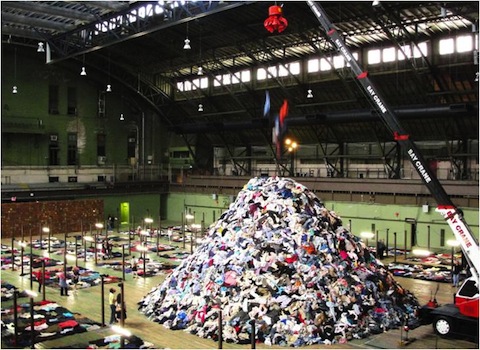When Christian Boltanski proposed his idea for an art installation at the Park Avenue Armory in 2010, no one expected him to use so many clothes. Sitting at the center of the expansive installation was a 40-foot-tall mound of clothing, flanked by an industrial crane.

Credit: Park Avenue Armory
For Boltanski, clothes are simply a placeholder for real human beings who lived real lives. He told a journalist, “In my work there have always been a lot of photos of people, heartbeats of people—for me the clothing are people.” The magnitude of the pile illustrates the heaviness of all the hearts now lost.
The only regret Boltanski had about the art piece was that the clothes he picked didn’t smell earthy enough to drive home his point about people occupying the clothes. He said, “I was a little disappointed, because the clothes don’t smell.”
The mountain of people was part of the artist’s showcase, “No Man’s Land,” a musing on life and death. Although the art piece seemed like a simple pile of clothes, there was deep symbolism under the surface.

Credit: Park Avenue Armory
Every article of clothing symbolized one person, so the piece represents an estimated 6,000 people. The crane was the metaphoric hand of God, according to Boltanski. A hook at the end of the crane reached for clothes laid in neat stacks around the warehouse. Each piece of clothing was deposited on top of the mountain pile, symbolically carrying the “souls” of those who inhabited the clothes to a “higher place.”
In this work, the mountain was an eternal afterlife of sorts, where every individual rests after death.
In this work, the mountain was an eternal afterlife of sorts, where every individual rests after death. In Boltanski’s view, we are all mixed together in death, no longer the distinct individuals we were in life. We become part of a great pile, individual pieces that have lost their minute details — a single, colossal entity.
Through “No Man’s Land,” Boltanski tried to show us that destiny cannot be avoided, and that there is freedom in this lack of choice. None of us can choose when or how we die, and none of us can cheat death, but embracing the inevitable is a positive act that brings us comfort and freedom, Boltanski explains, “When the clothes are falling down, it’s very optimistic. Like souls, they are free.”

 Clothes As Bodies: The Art of Christian Boltanski
Clothes As Bodies: The Art of Christian Boltanski


 Are “Rage Rooms” a Healthy Outlet for Grief and Burnout?
Are “Rage Rooms” a Healthy Outlet for Grief and Burnout?
 How US Zip Codes Predict Health Outcomes
How US Zip Codes Predict Health Outcomes















